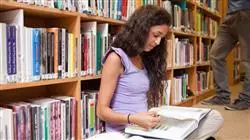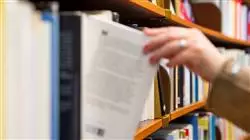University certificate
The world's largest faculty of education”
Why study at TECH?
This Postgraduate certificate in Teaching Language and Literature in High School will generate a sense of confidence in the performance of your profession, which will help you grow personally and professionally"

Teaching in high school implements the linguistic knowledge presented to the student at an early age and fosters the full development of communicative competencies. The attractive presentation of contents is a priority in the classroom to enhance the attention of the group, their motivation and approach to teaching contents and to favor their instruction and subsequent application.
The Postgraduate certificate pays special attention to the Teaching of Spanish as a foreign language (SFL) since one of the main objectives is to prepare teachers for teaching in multicultural groups when various languages are spoken. For all these reasons, different methodological approaches are presented to facilitate the teacher's work and the creation of activities within this specific framework. Interaction is essential to minimize the multicultural impact and enable the transition of the classroom from a teaching space to a social space. Finally, we will emphasize the relevance of information and communication technologies in the field of teaching.
The presence of ICT in the classroom brings wide-ranging benefits and helps in the presentation of content. Once again, the work of the teacher is a fundamental factor in its use, since they must create a digital resource database that is reliable and oriented to teaching in High School Education.
In conclusion, the Postgraduate certificate in Teaching Language and Literature in High School is focused on the development of skills in linguistics, comprehension and oral and written production. The development of a teaching plan and its corresponding units must be geared towards achieving a series of objectives also established at the beginning of the school year. One of the priorities in this Postgraduate certificate, is the relevance of teacher training for teaching Spanish as a foreign language and the practical application of these fundamentals in a multicultural group which has limited contact with the Spanish as the educator is often faced with this situation nowadays.
Finally, we present the benefits of using your own digital resource database that is practical and reliable in terms of its contents.
Update your knowledge through the Postgraduate certificate in Teaching Language and Literature in High School"
This Postgraduate certificate in Teaching Language and Literature in High School contains the most complete and up-to-date scientific program on the market. The most important features include:
- More than 75 case studies presented by experts in Teaching Language and Literature in High School
- The graphic, schematic, and practical contents with which they are created provide scientific and practical information on the disciplines that are essential for professional practice
- Latest information on Teaching Language and Literature in High School
- Practical exercises where the self-evaluation process can be carried out to improve learning
- With special emphasis on innovative methodologies in Teaching Language and Literature in High School
- All of this will be complemented by theoretical lessons, questions to the expert, debate forums on controversial topics, and individual reflection assignments
- Content that is accessible from any fixed or portable device with an Internet connection
This Postgraduate certificate may be the best investment you can make when selecting a refresher program, for two reasons: in addition to updating your knowledge in Teaching Language and Literature in High School, you will obtain a Postgraduate certificate from TECH"
It includes in its teaching staff professionals belonging to the field of Teaching Language and Literature in High School, who contribute the experience of their work to this program, in addition to recognized specialists belonging to reference societies and prestigious universities.
The multimedia content, developed with the latest educational technology, will provide the professional with situated and contextual learning, i.e., a simulated environment that will provide immersive learning programmed to train in real situations.
The design of this program is based on problem-based learning, through which the educator must try to solve the different situations of professional practice that arise throughout the Postgraduate certificate, for this, the educator will have the help of an innovative interactive video system made by recognized experts in the field of Teaching Language and Literature in High School with extensive teaching experience.
Increase your decision-making confidence by updating your knowledge through this Postgraduate certificate"

Make the most of the opportunity to learn about the latest advances in Teaching Language and Literature in High School and improve the education of your students"
Syllabus
The structure of the contents has been designed by a team of professionals from the best educational institutions and universities in the country, who are aware of the relevance of up-to-date, innovative learning and are committed to quality teaching using new educational technologies.

This Postgraduate certificate in Teaching Language and Literature in High School contains the most complete and up-to-date scientific program on the market”
Module 1. Methodology: Teaching and Programming
1.1. The Syllabus
1.1.1. What Is the Syllabus?
1.1.2. Functions
1.1.3. Elements of the Syllabus
1.1.4. Types of Syllabus
1.1.5. Features
1.1.6. Approaches of the Syllabus
1.1.7. Syllabus Design
1.1.8. Levels of Concreteness
1.1.9. The Fourth Level
1.1.10. Syllabus Structure
1.2. Competencies
1.2.1. What are Competencies?
1.2.2. A New Perspective
1.2.3. Features
1.2.4. Key Competencies
1.2.5. Competencies in the Syllabus
1.2.6. Strategies for their Application
1.2.7. Competencies in the Classroom
1.2.8. Teaching Competencies
1.2.9. Communicative Competencies
1.2.10. Competency-Based Assessment
1.3. Methodology
1.3.1. Introduction
1.3.2. Methodological Principles
1.3.3. Teaching Methods and Techniques
1.3.4. From Transmissive to Active Methods
1.3.5. Exercises vs. Activities
1.3.6. Methodological Strategies
1.3.7. Group Work vs. Cooperative Work
1.3.8. Cooperative Learning
1.3.9. Problem-Based Learning
1.3.10. Project Work
1.4. ICT in the Methodology
1.4.1. ICT Today
1.4.2. Digital Literacy
1.4.3. Educating in ICT
1.4.4. Consequences of the Change
1.4.5. ICT Competencies in Education
1.4.6. Digital Competencies
1.4.7. ICT in Class
1.4.8. ICT for Diversity
1.4.9. ICT Resources in the Classroom
1.4.10. ICT Resources in the Center
1.5. Assessment
1.5.1. The Classroom as an Assessment Context
1.5.2. Types of Assessments
1.5.3. Traditional Assessments
1.5.4. Current Assessments
1.5.5. How to Assess. Techniques and Instrumentation
1.5.6. Selection of Instruments and Techniques
1.5.7. What to Assess.
1.5.8. Assessment Meetings
1.5.9. Program Assessment
1.5.10. Assessment Together with the Teaching Staff
1.6. Educational Programming I
1.6.1. Introduction
1.6.2. The Importance of Educational Programming
1.6.3. Components
1.6.4. Justification
1.6.5. Objectives: Types
1.6.6. Objectives: Sources
1.6.7. Objectives: Formulation
1.6.8. Content: Types
1.6.9. Content: Selection and Organization Criteria
1.6.10. Content: Sequencing Criteria
1.7. Educational Programming II
1.7.1. Key Competencies
1.7.2. Methodology: Methodological Principles
1.7.3. Methodology: Area
1.7.4. Methodology: Methodological Strategies
1.7.5. Attention to Diversity
1.7.6. Resources
1.7.7. Assessment
1.7.8. Timing
1.7.9. Other Elements
1.7.10. Relationship Between the Elements of the Syllabus in the Educational Planning
1.8. Teaching Units I
1.8.1. Introduction
1.8.2. Relevance
1.8.3. Characteristics and Elements
1.8.4. Identification
1.8.5. General and Teaching Objectives
1.8.6. Assessment Criteria
1.8.7. Assessable Learning Standards
1.8.8. Indicators of achievement
1.8.9. Key Competencies
1.8.10. Contents
1.9. Teaching Units II
1.9.1. Methodological Strategies: Methods and Techniques
1.9.2. Activities: Their Role in Teaching Units
1.9.3. Activities: Classification
1.9.4. Activities: Characteristics
1.9.5. Sequence of Activities
1.9.6. Attention to Diversity
1.9.7. Resources
1.9.8. Evaluation: Instrument Selection
1.9.9. Evaluation: Student Qualification
1.9.10. Evaluation of the Teaching Unit: Final Reflection
1.10. Design of Educational Programming for Language and Literature
1.10.1. Characterization of the Material
1.10.2. Contribution of the Subject to the Development of Key Competencies
1.10.3. Communicative Approach
1.10.4. Communication Projects
1.10.5. Selection and Prioritization of the Content
1.10.6. Oral Comprehension and Production
1.10.7. Interaction
1.10.8. Reading
1.10.9. Writing
1.10.10. Literary Education
Module 2. Fundamentals of the Teaching Language and Literature
2.1. Teaching Language and Literature
2.1.1. Introduction to the Concept of Teaching
2.1.2. Teaching Language
2.1.3. Teaching Literature
2.1.4. Teaching from a Cultural Focus
2.2. The Language and Literature Syllabus
2.2.1. Definition of the Concept of a Syllabus
2.2.2. The Elements and Parts of the Syllabus
2.2.3. The Syllabus of Language and Literature in Primary Education
2.2.4. The Language and Literature Syllabus in High School Education
2.3. Oral Language Teaching
2.3.1. Elements of Oral Proficiency
2.3.2. Characteristics of Oral Language
2.3.3. Teaching Oral Communication
2.3.4. Teaching Proposals
2.4. Teaching Written Language
2.4.1. Definition of the Concept of Written Language
2.4.2. Key Elements in the Teaching Written Language
2.4.3. ICT in the Teaching Language
2.4.4. Written Language Evaluation
2.5. Teaching Reading
2.5.1. Analysis of the Concept of Teaching Reading
2.5.2. Development and Characteristics of the Reading Process in Primary Education
2.5.3. The Promotion of Reading in the Educational Stage
2.5.4. Practical Applications of Teaching Reading
2.6. Literary Education
2.6.1. Definition of Teaching Literature
2.6.2. Elements of the Teaching Literature
2.6.3. Teaching Methodologies of Literature
2.6.4. Evaluation of Literary Education
2.7. Practical Applications
2.7.1. Definition of Educational Programming
2.7.2. Elements of Educational Programming
2.7.3. Development of a Program for Spanish Language and Literature

A unique, key, and decisive educational experience to boost your professional development”
Postgraduate Certificate in Didactics of Language and Literature in Secondary and Baccalaureate.
If you are a secondary or high school teacher and want to improve your skills in teaching language and literature, the Postgraduate Certificate in Language and Literature Didactics in Secondary and High School at TECH Global University is the perfect opportunity to do so. At TECH, we are proud to offer academic programs of excellence, adapted to the current needs of education professionals. Our online Postgraduate Certificate, with a flexible duration of 1 to 3 months, will allow you to study from the comfort of your home or any other location, adapting your schedule according to your availability.
Expand your knowledge and improve your pedagogical skills.
During this Postgraduate Certificate, you will deepen your knowledge of the theoretical and methodological foundations of language and literature teaching at the secondary and high school levels. You will learn innovative teaching strategies and up-to-date pedagogical resources to motivate and develop your students' linguistic and literary skills. Online classes offer the flexibility needed to organize your study time according to your responsibilities and commitments. Through interactive online platforms, you will have access to specialized materials, didactic resources and practical activities that will help you apply the knowledge acquired in your teaching practice. You will be advised by highly qualified professors, specialized in language and literature didactics, who will provide you with personalized guidance and answer your questions throughout the Postgraduate Certificate. You will also be able to interact with other education professionals, sharing experiences and enriching your learning. At the end of the Postgraduate Certificate, you will be prepared to design and apply effective pedagogical strategies, fostering interest and meaningful learning of your students in the field of language and literature. Boost your professional development and provide quality education to your students!







